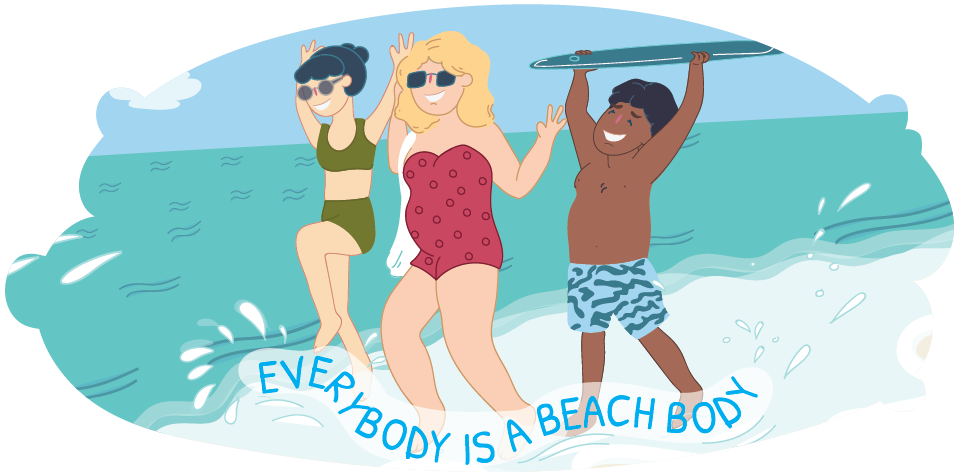Types of eating disorders explained
Eating disorders can come in many forms. Here are the most common types and their warning signs.
Content Warning: this article contains information about mental health which may be distressing or triggering.

Common types of eating disorders
There are four common types of eating disorders, which are:
- Binge eating disorder
- Bulimia nervosa
- Anorexia nervosa
- Other specified feeding and eating disorders (OSFED)
Binge Eating Disorder
People with binge eating disorder feel unable to stop themselves from eating and can eat a very large amount of food in a short space of time, even when they feel full.
Here are some signs that someone might have binge eating disorder:
Feeling a lack of control around food or eating
Eating large amounts of food regularly, even when they’re not hungry
Feelings of embarrassment, guilt or disgust about overeating
Sensitive to comments around food, weight or appearance
Feeling extremely upset or anxious after overeating
Eating to the point of feeling uncomfortably full
Being secretive about what they eat and when
Eating alone, in secret or avoiding social events around food
Shoplifting food or spending large amounts of money on food
Hiding food or food wrappers around the house
Feeling embarrassed or ashamed of their body or weight
Experiencing anxiety, depression, irritability or low self-esteem
Avoiding questions about eating and weight
Bulimia Nervosa
Like binge eating disorder, people with bulimia nervosa eat a large amount of food in a short period (bingeing) but then take action to get rid of this food (purging), such as vomiting, over-exercising or not eating for a long period.
Here are some signs that someone might have bulimia nervosa:
- Fearful of gaining weight
- Putting on or losing weight really quickly
- Having a distorted body image or low self-esteem
- Feeling depressed, anxious or guilty - especially at meal times
- Obsessing over eating, food, body shape and weight
- Fasting, counting calories or avoiding food groups
- Over-exercising or continuing to exercise when sick or injured
- Vomiting, misusing laxatives or appetite suppressants
- Going to the bathroom during or shortly after meals
- Buying lots of food and hiding it
- Using drugs (legal or illegal) inappropriately to control weight
- Eating in private and avoiding meals with others
- Sensitive to comments about food, weight, body shape or exercise
- Physical signs like tooth decay, feeling tired, dizziness
Anorexia Nervosa
People with anorexia have intense fear of gaining weight and reduce the amount of food they eat, which leads them to being significantly underweight. Some may also binge, purge or exercise excessively.
Here are some signs that someone might have anorexia nervosa:
Losing weight really quickly
Feeling faint, dizzy, tired or cold all the time
Seeing themselves as overweight when they’re actually underweight
Obsessing over food, body shape, weight or appearance
Counting calories, constant dieting or avoiding food groups
Low self-esteem (guilt, self-criticism, worthlessness)
Black and white thinking or trouble concentrating
Saying they’ve eaten when they haven’t or hiding uneaten food
Sensitive to comments about body shape, weight or eating
Over-exercising or continuing to exercise when sick or injured
Vomiting, misusing laxatives or appetite suppressants
Changes in their clothing style or appearance
Avoiding situations involving food or spending more time alone
Having rituals around food (cutting into small pieces, eating slowly)
Feeling anxious or upset around meal times
Very fearful of gaining weight
Frequently body-checking (weighing, looking in the mirror)
"I'm an anorexia and depression survivor."
Other Specified Feeding or Eating Disorder (OSFED)
People with OSFED have many of the symptoms of the other eating disorders, but don’t meet all the symptoms needed for a diagnosis of anorexia nervosa, bulimia nervosa or binge eating disorder.
Here’s some signs that someone might have OSFED:
- Sudden weight loss or weight gain
- Seeming obsessed with food, eating, weight or body shape
- Problems with body image and low self-esteem
- Feelings of shame or guilt, especially after eating
- Sensitive to comments around food, weight or body shape
- Skipping meals, counting calories or avoiding certain food groups
- Binge eating or eating at unusual times
- Going to the bathroom during or shortly after meals
- Over-exercising or continuing to exercise when sick or injured
- Frequently body-checking (weighing, looking in the mirror)
- Saying they’ve eaten when they haven’t or hiding uneaten food
- Avoiding situations involving food, or spending more time alone
- Physical signs like feeling faint or dizzy
Eating disorders can have a devastating impact on someone’s health. It’s important to seek support as soon as you notice any warning signs.
Who can help
If you think that you or someone you know is showing signs of an eating disorder, it’s important to seek help as soon as possible.
Here’s who can help:
You don’t have to go through this alone.
We’re here to help.
Give us a call, start a WebChat or email us today.
If you are looking for more digital services and resources, check out Head to Health.
Check these out too:
Eating disorders
Eating disorders are serious and have a big impact on someone’s ...
READ MEDeveloping a positive body image
If you sometimes judge yourself and feel uncomfortable in your own body, ...
READ MELooking after yourself
If you’re juggling lots of things like school, chores, sports and ...
READ MEHow to ask for help
Sometimes we need help but we're not able to ask for it. ...
READ METalking helps! We’re here for you.
No problem is too big or too small.
We're here 24 hours a day, 7 days a week






